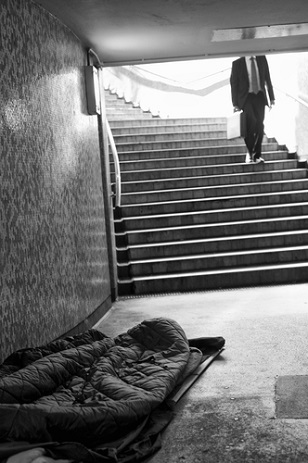It was the best of times, it was the worst of times…
I want to tell you a tale of two countries, Country A and Country B.
Country A has extraordinary wealth. In fact, according to the World Bank, national income per person in Country A is behind just Singapore, Norway, Luxembourg, Hong Kong and Switzerland.
In the past six years, total wealth in Country A is up over $34 trillion.
That $34 trillion equals out to roughly $100,000 per person in Country A.
And if you’re a business executive in Country A, you’re doing even better, because the ratio of CEO to average worker pay in Country A is a whopping 273-1.
But things aren’t so great over in Country B.
In Country B, 3.5 million people are working full-time jobs that only pay the minimum wage.
As of 2012, 46.5 million people in Country B were living in poverty, while 49 million people were struggling with hunger and food insecurity.
And over 610,000 people in Country B are homeless, forced to live on the streets in a never-ending struggle to survive.
Country B has the 17th-highest poverty rate of countries in the Organization for Economic Cooperation and Development, and the disposable income of families in the middle income bracket in Country B decreased 4 percent between 2000 and 2010.
So, what country is Country A, and what country is Country B?
Well, they’re both the United States.
The U.S. is filthy rich, but the reality is that only the wealthy elite are benefiting from our nation’s great wealth.
Total wealth in the U.S. may be up over $34 trillion since the Great Recession, but that wealth isn’t going to every man, woman, and child in America.
Instead, it’s going to the wealthy elite.
As the blog USAgainstGreed.Org points out, as of 2013, there were 3.6 million full-time minimum wage workers in America, and their combined 2013 earnings were less than the 2013 stock market gains of 8 of the richest Americans alone.
Meanwhile, the richest 10% of Americans control over two-thirds of the nation’s total wealth, while the average household income for the bottom 90% of Americans is just under $30,000.
And, since 1979, the top 1 percent of Americans have seen a 155% increase in after-tax income, while the bottom 20% of Americans have seen just a 45% change in income.
So, how did we get here?
How did we get to a point in our history where our nation has record levels of wealth, but millions of people are still struggling with hunger, poverty and homelessness?
It’s all thanks to Reaganomics.
The income gap in America has widened exponentially since Reagan took office and implemented the so-called “Reagan Tax Cuts.”
Between 1947 and 1980, income gains were shared fairly equally between the wealthiest Americans and everyone else.
But then Reagan came to Washington and everything changed.
The wealthy elite began to take home more of our nation’s income gains, while income gains for everyone else began to stay relatively stagnant.
In 1980, the top 1 percent of Americans controlled 10% of annual U.S. income. In 2007, the top 1 percent controlled 23.5% of annual U.S. income; the highest it’s been since the Great Depression.
America really is a tale of two cities right now; one city that is seeing record levels of wealth and income, and is filled with people living lives of luxury, and another city that is facing record levels of poverty and despair, whose people are struggling to put food on the table and a roof over their heads.
And this divide is getting larger by the day.
It’s time to ensure that all Americans are able to share in the wealth of our great nation, and that starts with a complete repudiation of Reaganomics, because Reaganomics has been a complete and utter failure. It’s that simple.
Americans need to stand up, and demand that we start sharing the wealth, like we did so successfully before Reagan came to Washington.
America is one nation. It’s time we started acting like it.
Our most important fundraising appeal of the year
December is the most critical time of year for Truthout, because our nonprofit news is funded almost entirely by individual donations from readers like you. So before you navigate away, we ask that you take just a second to support Truthout with a tax-deductible donation.
This year is a little different. We are up against a far-reaching, wide-scale attack on press freedom coming from the Trump administration. 2025 was a year of frightening censorship, news industry corporate consolidation, and worsening financial conditions for progressive nonprofits across the board.
We can only resist Trump’s agenda by cultivating a strong base of support. The right-wing mediasphere is funded comfortably by billionaire owners and venture capitalist philanthropists. At Truthout, we have you.
We’ve set an ambitious target for our year-end campaign — a goal of $125,000 to keep up our fight against authoritarianism in 2026. Please take a meaningful action in this fight: make a one-time or monthly donation to Truthout before December 31. If you have the means, please dig deep.
